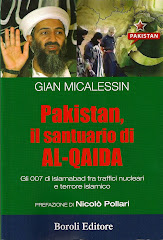Failed N.Y. attack highlights mistrust that still marks U.S.-Pakistani relations
By Pamela Constable and Karin Brulliard
Washington Post Foreign Service
Tuesday, May 11, 2010; A08
ISLAMABAD, PAKISTAN -- Despite what U.S. and Pakistani officials call a marked improvement in cooperation, the attempted Times Square bombing has highlighted the mistrust that still plagues their partnership.
U.S. officials have praised Pakistan for its swift work in tracing Pakistani American suspect Faisal Shahzad's local ties as well as its ongoing military operations against the domestic Taliban, but they also want the nation to do more to curb other extremist groups that preach jihad and offer help to would-be terrorists.
U.S. allegations Sunday that Shahzad received help from Pakistani Taliban militants in the country's northwest also seem likely to put pressure on Pakistan to launch army operations in the tribal region of North Waziristan. Until now, army leaders have resisted, partly because troops are bogged down in other anti-Taliban actions and partly because an offensive could turn friendly local fighters against the state.
A Pakistani security official said senior officials are contemplating an offensive in North Waziristan because the Pakistani Taliban is gaining strength there and more-malleable militant groups are losing control. He said that Pakistani thinking on North Waziristan has nothing to do with the attempted New York attack but rather that the presence of "terrorists" there is "a huge problem that needs to be addressed." He gave no timetable for an offensive.
Many Pakistanis have condemned the attempted bombing, saying Shahzad's alleged actions were un-Islamic and hurt both countries. But in editorials, sermons and protests, activists have blamed the West for spotlighting Pakistan as a source of terrorism because of one incident.
The Nation newspaper, an outlet for nationalist views, declared, "It is crystal clear that the U.S. government is always behind such planted arrests." On Sunday, thousands of supporters of the Jamaat-e-Islami religious party protested in Karachi. Several said they were sure Shahzad had been set up by the CIA. "He's an innocent person. They want to interlink Faisal Shahzad and the Taliban and create a conspiracy against Pakistan," said Fahad Kashif Iqbal, 20, a student.
Some Pakistani officials have lent credence to such theories or have sought to explain the attempted attack as a reaction to U.S. policy. Interior Minister Rehman Malik said initially that before cooperating with the United States, "one has to see, is it some conspiracy against Pakistan?" Foreign Minister Shah Mahmood Qureshi said the attempted bombing could have been a response to U.S. drone attacks in the Pakistani tribal areas.
Although most experts and politicians dismissed the conspiracy theories, they too complained that the incident has tarred Pakistan's reputation. Mushahid Hussain, a leader of the political opposition, said the tendency to link Pakistan with "anything bad, anywhere in the world," was very damaging to his country's image. "It's Pakistan-bashing season," he said.
Adding to the sense of indignation were televised comments made by Secretary of State Hillary Rodham Clinton on the CBS program "60 Minutes" on Sunday night. Clinton warned that Pakistan would face "severe consequences" if a future terrorist attack on U.S. soil were traced back to Pakistan.
"Clinton's statement and threatening tone will revive Pakistani fears that no matter how much we do, it won't be enough," said Rifaat Hussain, a professor of defense and strategic studies at Quaid-i-Azam University in Islamabad. "Pakistan has bent over backwards to cooperate on this case. My question is, what more can we do?"
Hussain said that army leaders have made it clear they "mean business" about defeating the Taliban but that they want to control the "timing and details" of their operations. "There is always an element of doubt and mistrust when it comes to sharing strategic intelligence, but there is no doubt about the strategic intent," he said.
Yet recent events have muddled that argument, including reports that even as Pakistani authorities won U.S. praise for arresting a Taliban leader in Karachi this year, they allowed several others to escape. Experts said the intelligence services remain sympathetic to domestic extremist groups they once sponsored to fight foreign wars, while civilian leaders have hesitated to challenge them.
On Friday, the leader of a front group for the banned anti-India militia Lashkar-i-Taiba delivered a ringing sermon in a mosque in Lahore. Hafiz Sayeed, once held under house arrest for alleged links to the 2008 terror attacks in Mumbai, declared that "every terrorist attack attributed to Pakistan is just an attempt to pave the way for the nefarious designs" of the West.
The shifting, sometimes contradictory actions of Pakistani state agencies have long bedeviled U.S. anti-terror efforts and bilateral relations.
Rather than developing a unified plan and message to combat Islamist extremism, the government has multiple agendas and speaks with many voices, confusing both its Western allies and its Muslim populace.
"When one Pakistani American goes the al-Qaeda way, all the dirt falls on Pakistan, but the challenge is much larger than one individual's actions," said Imtiaz Gul, an expert on Islamist extremism in Pakistan. "We need the will to fight these groups. We need to develop a counter-radicalization strategy, but everything is driven by expedience."
Constable reported from Islamabad and Lahore. Brulliard reported from Karachi. Special correspondent Shaiq Hussain reported from Islamaba
Iscriviti a:
Commenti sul post (Atom)



Nessun commento:
Posta un commento